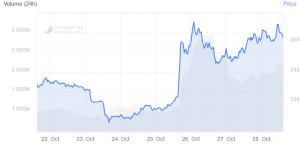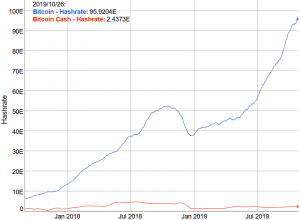While Bitcoin Cash Network’s Security was in Question, BCH Rallied
While the Bitcoin (BTC) hashrate is breaking records, its fork, Bitcoin Cash (BCH), seems to have run into some troubles. People noticed that the blocks are slow and only partially full, and it turned out that an unknown miner controlled 50% of the network hash rate. Still, it seems that the coin’s price wasn’t affected. As a matter of fact, while all this was developing, BCH price was rising. (Updated on October 29th, 8:19 UTC with a comment by Roger Ver: updates in bold.)

At pixel time (15:02 UTC), BCH trades at c. USD 263 and is almost unchanged in the past 24 hours, while BTC is down by 1.65%. BCH is up by almost 13% in the past week.
BCH price chart:

___
Hashrate comparison

While slow blocks are certainly not a novelty, BCH blocks have raised some eyebrows recently as they seem to have been slow and partially full, and according to a recent tweet by a user called ‘dennis’, instead of c. 10 minutes, BCH had a three hour time between blocks. “When a block was finally produced, it was only 2.4MB (less than 10% of the 32MB cap),” says the user. “Hashpower was 0.1% of Bitcoin’s. Someone needs to put this coin out of its misery.”
Bitcoin educator Andreas M. Antonopoulos explained that the BCH chain switched to a different mining difficulty targeting algorithm from the BTC chain after the fork in 2017. “There appear to be some problems with BCH mining,” he said, “perhaps related to the difficulty re-targeting algorithm. Many people have shared their opinions on why this happened:
However, Antonopoulos added: “It also appears one entity is now in effective control of mining.” Similarly, Jameson Lopp, Chief Technology Officer (CTO) of crypto security specialist Casa, noticed that “Bitcoin Cash’s improved Difficulty Adjustment Algorithm was supposed to reduce block time variance, but that “it’s looking rather volatile lately, often seeing hourlong periods with 2 blocks or with 20+ blocks.” User ‘zender’ however suggested that BCH is undergoing an attack.
Security concerns
The information, apparently first posted on Reddit, rushed through the Cryptosphere that there seemed to have been an attack on the BCH network, and that there is a miner controlling 50% of the network’s hash rate. This is of major importance, as the person or a group that controls the majority of the network effectively controls the entire thing, which might be used against the network.
In his Twitter thread, ‘hash.fail,’ self-identified as a Blockchain research specialist, said that “there is *enormous cause for concern* as the entity in question on the Bitcoin Cash blockchain essentially has full control over the chain at this point in time.” The research specialist continues, explaining that an educated guess about who mined a given block can be made from the address receiving ‘coinbase’ transaction [block reward] and/or the mining pools that sign blocks, he says. These are some of the conclusions he makes in regards to the address in question:
- it has been the recipient of countless coinbase rewards, which would suggest that its working in unison with whatever entity/entities it’s attached to;
- the address is not only dominating in terms of percentage of blocks found/won, but it is also finding blocks “at an absurd rate,” with 24 blocks found in just two hours on October 26th, instead of an expected average of 6 blocks/hour.
- with this ‘unknown’ entity finding 24 blocks in 2 hours, “it is not only beating out the entire network, it’s pretty much ‘broken’ the retargeting algorithm for BCH”;
- at one point, ‘unknown’ has won 8/14 blocks, meaning that “between this entity & BTC.top, no one else has won a block on the protocol (besides BTCC) since block 606283”;
- additionally, 21 blocks have been found in an hour;
- BCH developers “are aware of the problem,” but “there’s nothing that they can realistically do about the situation since it’s out of their hands.”
“It is strongly recommended that users *avoid transacting on or with BCH at any and all costs* until this issue is resolved,” ‘hash.fail’ concludes.
But this is not the end of potential problems, as some suggest that BCH could now be attacked by a larger number of entities.
And miners could be facing additional consequences as well:
People continue to debate what exactly happened, with a number of different theories going around the Cryptoworld, including the one by a Redditor ‘bitmeister’ saying that they “think this is a sign of the approaching [mining reward halving],” and that “we will likely see more miners experimenting and playing with their otherwise useless BTC hashpower by pointing it at BCH.”
On the other hand, the main proponent of BCH, Roger Ver, told us that “This is basically just fear mongering,” adding “One of the best things about BCH is that the blocks are never full. Full blocks and the massive problems they cause were the entire reason for the reservation of Bitcoin in the form of Bitcoin Cash. BCH currently has less hash rate than BTC, but that will change as BCH has more and more commercial adoption.”




